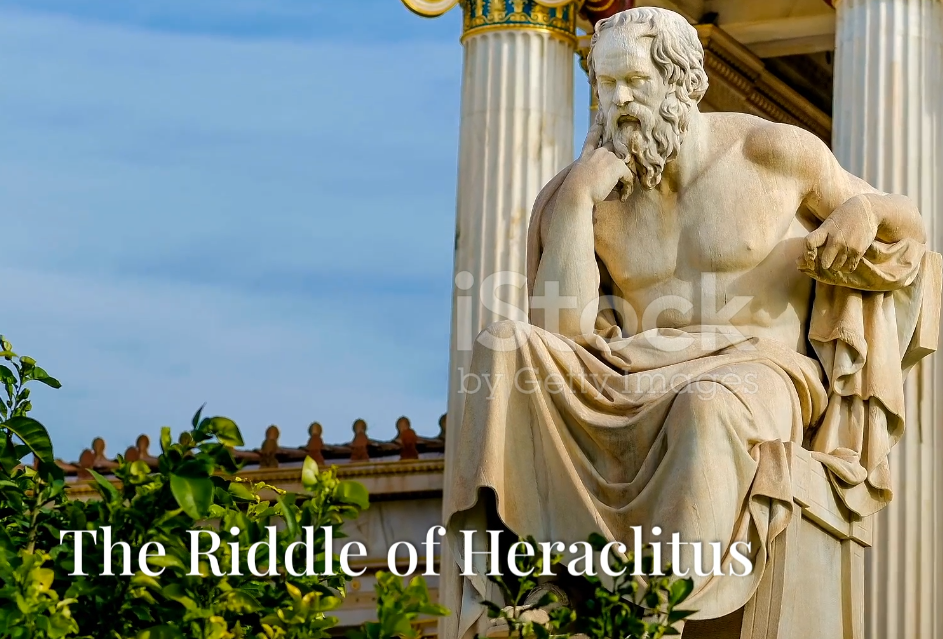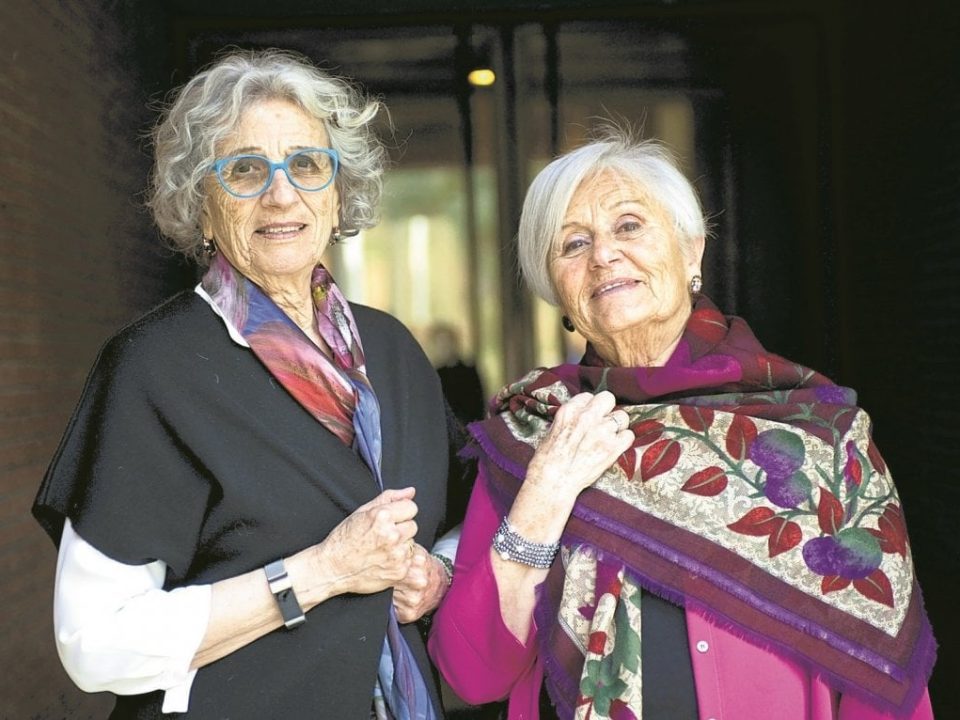
Volontariato
27 Gennaio 2019
Confronto tra Il principe e i Discorsi sopra la prima deca di Tito Livio
27 Gennaio 2019Heraclitus of Ephesus was one of the most important pre-Socratic philosophers, known for his dynamic and processual view of reality.
In contrast to Parmenides, who asserted the immutability of being, Heraclitus argued that everything is in constant motion and transformation.
Becoming as a Fundamental Principle
The key concept in Heraclitus’s thought is that of becoming. Everything that exists is in constant flux; nothing remains the same. The famous phrase “panta rhei” (everything flows) perfectly encapsulates this idea.
Fire as Arché: Heraclitus identified fire as the original principle of all things, a dynamic and ever-changing element that both creates and destroys everything that exists. Logos: Heraclitus introduces the concept of logos, a word that can be translated as “reason,” “word,” or “law.” Logos is the hidden order that governs the cosmos, the rational force that unifies opposites and guides the process of becoming. The Unity of Opposites: According to Heraclitus, opposites are not in contradiction but rather complement each other. Life and death, day and night, hot and cold are inseparable aspects of the same reality. Heraclitus and Parmenides: A Comparison
To sum up, Heraclitus and Parmenides represent two opposing poles in pre-Socratic philosophy:
- Parmenides: Asserts the existence of a unique, unchanging, and eternal being.
- Heraclitus: Supports the continuous and unceasing becoming of all things.
Despite apparent contradictions, both philosophers contributed to laying the foundation for philosophical reflection on the nature of reality, knowledge, and language.
The Concept of Logos in Heraclitus
Logos is one of the most important and controversial concepts in Heraclitus’s thought. It is a polysemic term that can be translated in various ways: reason, word, law, discourse, calculation. For Heraclitus, logos represents the underlying order of the apparent chaos in the world, the rational force that governs universal becoming.
- Order in Chaos: Logos unifies opposites, creating a hidden harmony behind the continuous transformation of things. It is the law that regulates the play of contrasting forces, ensuring the balance of the cosmos.
- Fire and Logos: Often, logos is associated with fire, the primal element for Heraclitus. Fire symbolizes transformation, energy, and life, representing the dynamic force that animates logos.
- Language and Thought: Logos is also the principle that makes communication and understanding between people possible. It is the word that gives form to thought, allowing us to know the world.
In summary, logos is the ordering principle of the universe, the rational force that unifies opposites and enables knowledge.
Heraclitus and Metaphysics: Becoming as the Foundation of Being
Heraclitus profoundly influenced metaphysical reflection on the nature of being and becoming. His statement that “everything flows” (panta rhei) challenged the static conception of being typical of previous philosophy.
- Being as Process: For Heraclitus, being is not a static substance but a dynamic process. Being is becoming itself, a continuous flow of opposites generating and destroying one another.
- The Unity of Opposites: Heraclitus introduced the idea that opposites are not contradictory but are intrinsically linked and necessary to each other. This concept has influenced many later philosophies, from Hegelian dialectics to quantum physics.
- Logos as Ordering Principle: As we have seen, logos is the rational force that governs becoming, ensuring an underlying order in the apparent chaos of the world by uniting opposites in a higher unity.
In short, Heraclitus offered a dynamic and processual view of reality, surpassing the static nature of Parmenidean being.
Heraclitus and Science: Anticipating the Future
Heraclitus’s thought presents surprising parallels with some modern scientific theories:
- Thermodynamics: The law of energy conservation, a fundamental principle of thermodynamics, recalls the Heraclitean idea of fire as a dynamic and transformative principle.
- Theory of Relativity: Einstein’s theory of relativity, which describes space and time as relative and interconnected entities, echoes the Heraclitean conception of continuous becoming and the unity of opposites.
- Chaos Theory: Chaos theory, which studies complex and unpredictable dynamic systems, finds an anticipation in Heraclitus’s thought, which emphasizes the chaotic and indeterministic nature of the world.
These parallels suggest that some of Heraclitus’s insights, although expressed in a pre-scientific language, remain surprisingly relevant.
Criticisms of Heraclitus’s Thought
Heraclitus’s thought has been the subject of numerous criticisms over the centuries:
- Obscurity: Heraclitus’s aphoristic and often enigmatic style has made his thought difficult to interpret.
- Relativism: Some have accused Heraclitus of relativism, arguing that his conception of becoming makes stable and objective knowledge impossible.
- Panta Rhei: His assertion that “everything flows” has been interpreted as a denial of the possibility of any certain knowledge.
Despite these criticisms, Heraclitus’s thought continues to fascinate philosophers and thinkers of every age. His dynamic and processual view of reality, his insight into the unity of opposites, and his search for an ordering principle underlying the chaos of the world represent a fundamental contribution to the history of thought, as we will now explain further.
The Influence of Heraclitus
Heraclitus’s thought has had a profound influence on Western philosophy. Some of his key concepts were taken up and reworked by later philosophers, such as:
- Stoics: The Stoics took up the concept of logos, identifying it with the cosmic reason that governs the universe.
- Hegel: German philosopher Georg Wilhelm Friedrich Hegel developed a philosophy of history based on the concept of dialectics, inspired by Heraclitus’s idea of the unity of opposites.
- Nietzsche: Friedrich Nietzsche took from Heraclitus the concept of becoming as a vital and creative force.
Let us now go into detail about the relationship between Heraclitus and later philosophers.
The Relationship between Heraclitus and the Sophists
Heraclitus and the Sophists, although contemporaries, represent two very different philosophical attitudes:
- Relativism vs. Absolutism: The Sophists, like Protagoras, supported relativism, the idea that truth is relative to the individual and his perceptions. Heraclitus, although asserting becoming, believed in a rational and universal order, represented by logos.
- Language: Both were interested in language, but with different perspectives. The Sophists used it as a tool of persuasion and manipulation, while for Heraclitus, language was a means of accessing truth and understanding the order of the cosmos.
- Politics: Heraclitus had a critical view of society and politics, while the Sophists were often at the service of tyrants and politicians, using their rhetorical skills to manipulate the masses.
In conclusion, while the Sophists questioned the possibility of objective knowledge, Heraclitus, while recognizing the complexity of the world, sought a rational foundation for knowledge.
The Relationship between Heraclitus and Plato
Heraclitus and Plato, although belonging to different generations and having developed distinct philosophies, share some fundamental premises and present interesting points of contact:
- Critique of the Sensible World: Both philosophers express a certain distrust of the sensible world, which they consider mutable and deceptive. Plato, with his theory of Ideas, postulates an intelligible, eternal, and immutable world beyond sensible appearances. Heraclitus, while not postulating a world of ideas, emphasizes the fluid and changing nature of the sensible world.
- Importance of Reason: Both Heraclitus and Plato attribute great importance to reason as a tool for understanding reality. Heraclitus, with his concept of logos, asserts that reason is the underlying order of the apparent chaos of the world. Plato, in turn, argues that only through reason can we access the world of Ideas and know the true reality.
- Concept of Unity: Both philosophers seek a unifying principle that explains the diversity and complexity of the world. Heraclitus finds it in logos, Plato in Ideas.
However, there are also significant differences between the two philosophers:
- Conception of Time: Heraclitus emphasizes becoming and the fluid nature of time, while Plato, although recognizing time as a characteristic of the sensible world, tends to privilege the eternity of Ideas.
- Method: Heraclitus uses often obscure and aphoristic language, while Plato develops a complex and articulated philosophical system, through dialogues and demonstrations.
In summary, the relationship between Heraclitus and Plato is complex and multifaceted. Both contributed fundamentally to the development of Western philosophy, but their perspectives present both affinities and significant differences.
The Influence of Heraclitus on Medieval Philosophy
Heraclitus’s influence on medieval philosophy was indirect and complex. His ideas were taken up and reinterpreted in different ways by various authors:
- Augustine: Saint Augustine took from Heraclitus the idea of time as a continuous flow and the importance of inner conversion.
- Scholasticism: The Scholastics used some Heraclitean concepts, such as that of the unity of opposites, to interpret Christian doctrine.
In summary, Heraclitus’s thought provided an important contribution to medieval philosophical reflection, particularly on the themes of time, change, and the unity of reality.
Heraclitus and Eastern Philosophy: A Dialogue Between Cultures
Heraclitus’s thought has affinities with some Eastern philosophies, particularly Taoism:
- Becoming and the Tao: The Taoist concept of Tao shares with Heraclitus’s logos the idea of a universal order that governs the world.
- Unity of Opposites: Like Heraclitus, Taoism emphasizes the unity of opposites, represented by the symbol of yin and yang.
Although these similarities are indirect, they indicate that Heraclitus’s thought has a universal and intercultural dimension.
In conclusion, Heraclitus’s thought continues to be a source of inspiration for philosophers, scientists, and thinkers of every era. His dynamic and process-oriented view of reality, his insight into the unity of opposites, and his search for an underlying ordering principle in the chaos of the world represent a fundamental contribution to the history of thought.
Heraclitus’s Influence on Political Thought
Heraclitus’s thought has had an indirect but significant influence on political thought. Several key Heraclitean concepts, such as logos, the unity of opposites, and becoming, have been taken up and reworked by various political thinkers:
- Concept of the State: Heraclitus influenced the concept of the state as a living organism, constantly evolving and subject to internal tensions.
- Justice and Law: The concept of logos as a universal law governing the cosmos has influenced reflections on justice and law.
- Change and Revolution: The idea of becoming has inspired some political theories that emphasize the importance of change and revolution.
In summary, Heraclitus’s thought contributed to developing a dynamic and processual view of politics, highlighting the importance of balancing opposing forces and the need for continuous adaptation to change.
Heraclitus’s Influence on Medieval Philosophy
Heraclitus’s influence on medieval philosophy was indirect and complex. His ideas were taken up and reinterpreted in various ways by different authors:
- Augustine: Saint Augustine adopted Heraclitus’s idea of time as a continuous flow and the importance of inner conversion.
- Scholasticism: Scholastic thinkers used certain Heraclitean concepts, such as the unity of opposites, to interpret Christian doctrine.
In summary, Heraclitus’s thought provided an important contribution to medieval philosophical reflection, particularly on the themes of time, change, and the unity of reality.
Modern Interpretations of Heraclitean Thought
Heraclitus’s thought continues to inspire contemporary philosophers. His ideas have been reworked and reinterpreted in various contexts and have helped shape some of the major philosophical trends of the 20th and 21st centuries:
- Process Philosophy: Philosophers like Whitehead have adopted Heraclitus’s idea of becoming as the foundation of reality, developing a process philosophy that emphasizes the dynamic and relational nature of all things.
- Philosophy of Science: Some philosophers of science have found in Heraclitus’s thought early elements of modern theories such as chaos theory and the theory of relativity.
- Eastern Philosophy: Heraclitus’s thought has often been compared and related to Eastern philosophies like Taoism, highlighting deep affinities between the two traditions.
In summary, Heraclitus’s thought remains a source of inspiration for contemporary philosophical reflection. His dynamic and process-oriented view of reality, his insight into the unity of opposites, and his search for an underlying ordering principle within the world’s chaos represent a fundamental contribution to the history of thought.
FILOSOFIA ANTICA
materiale didattico e appunti su atuttascuola
-
Appunti di filosofia greca Secondo modulo di filosofia antica: studio del pensiero da una prospettiva diversa, riflessioni e commenti dei testi di Anassimandro, Eraclito, Parmenide, Melisso e Simplicio – di Alissa Peron
-
Gli atomisti in formato pdf, di Zaira Gangi
materiale didattico e appunti su altri siti
-
Schema su Eraclito: dal Logos al panta rei di Fabio Utili
-
Gli aforismi di Eraclito del prof. Benito Marino in formato PDF
-
Eraclito. Due risvegli di Maura Del Serra
-
Eraclito di Diego Fusaro
-
Eraclito e Socrate di Hans Georg Gadamer
Audio Lezioni, ascolta il podcast di Filosofia del prof. Gaudio
Ascolta “Filosofia” su Spreaker.



